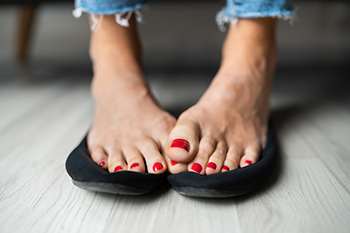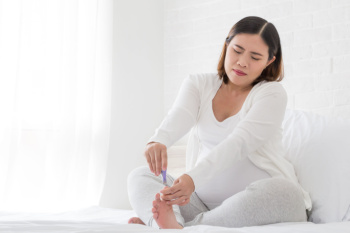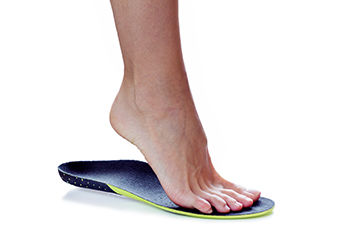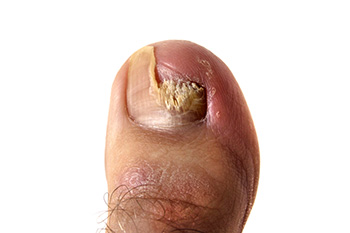Items filtered by date: March 2024
What Is Hyperhidrosis of the Feet?

Hyperhidrosis of the feet, a condition characterized by excessive sweating, can significantly impact daily life. Primary hyperhidrosis occurs without an underlying medical condition and often affects multiple areas, including the feet. Secondary hyperhidrosis stems from medical issues like hormonal imbalances or neurological disorders and may also affect the feet. Complications of hyperhidrosis include discomfort, odor, and an increased risk of skin infections like athlete's foot. Diagnosis typically involves a medical history review and physical examination. In some cases, tests like the starch-iodine test or the gravimetric test may be used to measure sweat production. Treatment options range from conservative measures to more invasive interventions. These include topical antiperspirants, iontophoresis, or using electrical currents to reduce sweat production. Additionally, oral medications like anticholinergics, botulinum toxin injections, and in severe cases, surgical procedures such as sympathectomy may be used to control hyperhidrosis. Tailored treatment plans depend on the severity of symptoms and individual patient preferences. If you have excessive sweating of the feet, it is suggested that you schedule an appointment with a podiatrist for a proper diagnosis and treatment.
If you are suffering from hyperhidrosis contact Donald Manger, DPM of Associated Podiatric Physicians, PA. Our doctor can provide the care you need to attend to all of your foot and ankle needs.
Hyperhidrosis of the Feet
Hyperhidrosis is a rare disorder that can cause people to have excessive sweating of their feet. This can usually occur all on its own without rigorous activity involved. People who suffer from hyperhidrosis may also experience sweaty palms.
Although it is said that sweating is a healthy process meant to cool down the body temperature and to maintain a proper internal temperature, hyperhidrosis may prove to be a huge hindrance on a person’s everyday life.
Plantar hyperhidrosis is considered to be the main form of hyperhidrosis. Secondary hyperhidrosis can refer to sweating that occurs in areas other than the feet or hands and armpits. Often this may be a sign of it being related to another medical condition such as menopause, hyperthyroidism and even Parkinson’s disease.
In order to alleviate this condition, it is important to see your doctor so that they may prescribe the necessary medications so that you can begin to live a normal life again. If this is left untreated, it is said that it will persist throughout an individual’s life.
A last resort approach would be surgery, but it is best to speak with your doctor to find out what may be the best treatment for you.
If you have any questions please feel free to contact our office located in Hamilton Township, NJ . We offer the newest diagnostic and treatment technologies for all your foot and ankle needs.
Who Is Most Prone to Ingrown Toenails?
 Ingrown toenails, a condition where the nail grows into the skin surrounding it, can affect certain people due to a combination of genetic predispositions, lifestyle choices, and physical activities. People can inherit toenail shapes that are more susceptible to becoming ingrown, such as overly curved or thick nails. These people may also have a familial history of the condition. Additionally, athletes and those engaged in activities that place repeated pressure on the toes, such as soccer, ballet, or running, are at a heightened risk due to the constant stress and trauma to the toenails. Improper footwear that constricts the toes can further exacerbate the likelihood of developing this painful condition. Additionally, improper nail care practices, including cutting toenails too short or with rounded edges, can result in the nail growing into the surrounding skin. Recognizing these risk factors can help you prevent ingrown toenails in the future. If you are suffering from an ingrown toenail, it is suggested you visit a podiatrist. This type of doctor can effectively treat ingrown toenails and offer you suggestions for prevention based on any risk factors you may have.
Ingrown toenails, a condition where the nail grows into the skin surrounding it, can affect certain people due to a combination of genetic predispositions, lifestyle choices, and physical activities. People can inherit toenail shapes that are more susceptible to becoming ingrown, such as overly curved or thick nails. These people may also have a familial history of the condition. Additionally, athletes and those engaged in activities that place repeated pressure on the toes, such as soccer, ballet, or running, are at a heightened risk due to the constant stress and trauma to the toenails. Improper footwear that constricts the toes can further exacerbate the likelihood of developing this painful condition. Additionally, improper nail care practices, including cutting toenails too short or with rounded edges, can result in the nail growing into the surrounding skin. Recognizing these risk factors can help you prevent ingrown toenails in the future. If you are suffering from an ingrown toenail, it is suggested you visit a podiatrist. This type of doctor can effectively treat ingrown toenails and offer you suggestions for prevention based on any risk factors you may have.
Ingrown toenails can become painful if they are not treated properly. For more information about ingrown toenails, contact Donald Manger, DPM of Associated Podiatric Physicians, PA. Our doctor can provide the care you need to keep you pain-free and on your feet.
Ingrown Toenails
Ingrown toenails occur when a toenail grows sideways into the bed of the nail, causing pain, swelling, and possibly infection.
Causes
- Bacterial infections
- Improper nail cutting such as cutting it too short or not straight across
- Trauma to the toe, such as stubbing, which causes the nail to grow back irregularly
- Ill-fitting shoes that bunch the toes too close together
- Genetic predisposition
Prevention
Because ingrown toenails are not something found outside of shoe-wearing cultures, going barefoot as often as possible will decrease the likeliness of developing ingrown toenails. Wearing proper fitting shoes and using proper cutting techniques will also help decrease your risk of developing ingrown toenails.
Treatment
Ingrown toenails are a very treatable foot condition. In minor cases, soaking the affected area in salt or antibacterial soaps will not only help with the ingrown nail itself, but also help prevent any infections from occurring. In more severe cases, surgery is an option. In either case, speaking to your podiatrist about this condition will help you get a better understanding of specific treatment options that are right for you.
If you have any questions please feel free to contact our office located in Hamilton Township, NJ . We offer the newest diagnostic and treatment technologies for all your foot and ankle needs.
Wounds That Don't Heal Need to Be Checked
The Mysteries of Orthotics

Patients often rely on podiatrists to understand how orthotics alleviate pain and prevent injuries. Determining the right orthotic type demands expertise in biomechanics, gait analysis, and understanding the patient's specific condition. Orthotics function by providing support, cushioning, and realignment to the feet, thereby correcting biomechanical abnormalities or imbalances. They distribute pressure evenly, reducing stress on vulnerable areas and promoting proper foot function. By stabilizing the foot and ankle, orthotics can correct issues such as overpronation or supination, which can lead to various foot and lower limb problems if left untreated. Additionally, orthotics can help improve posture and alleviate discomfort in other parts of the body, such as the knees, hips, and lower back. Podiatrists assess patients comprehensively to determine the most suitable orthotic design, material, and level of support to address their specific needs and enhance overall foot health and function. If you have chronic foot pain, it is suggested that you make an appointment with a podiatrist to determine if orthotics can help you.
If you are having discomfort in your feet and would like to try orthotics, contact Donald Manger, DPM from Associated Podiatric Physicians, PA. Our doctor can provide the care you need to keep you pain-free and on your feet.
What Are Orthotics?
Orthotics are inserts you can place into your shoes to help with a variety of foot problems such as flat feet or foot pain. Orthotics provide relief and comfort for minor foot and heel pain but can’t correct serious biomechanical problems in your feet.
Over-the-Counter Inserts
Orthotics come in a wide variety of over-the-counter inserts that are used to treat foot pain, heel pain, and minor problems. For example, arch supports can be inserted into your shoes to help correct overarched or flat feet, while gel insoles are often used because they provide comfort and relief from foot and heel pain by alleviating pressure.
Prescription Orthotics
If over-the-counter inserts don’t work for you or if you have a more severe foot concern, it is possible to have your podiatrist prescribe custom orthotics. These high-quality inserts are designed to treat problems such as abnormal motion, plantar fasciitis, and severe forms of heel pain. They can even be used to help patients suffering from diabetes by treating foot ulcers and painful calluses and are usually molded to your feet individually, which allows them to provide full support and comfort.
If you are experiencing minor to severe foot or heel pain, it’s recommended to speak with your podiatrist about the possibilities of using orthotics. A podiatrist can determine which type of orthotic is right for you and allow you to take the first steps towards being pain-free.
If you have any questions please contact our office located in Hamilton Township, NJ . We offer the newest diagnostic and treatment technologies for all your foot and ankle needs.
Need for Toenail Fungus Treatment

Yellowed, brittle, and unusual-looking toenails may indicate a fungal nail infection, known as onychomycosis. Experts caution that these infections persist without intervention and can easily be transmitted from person to person. These types of infections can be contracted through close contact or from barefoot walking in communal areas like locker rooms. The fungus infiltrates toenails, thriving in moist, sweaty footwear. Toenail fungus affects roughly one in ten people globally, and is more prevalent with age, affecting over half of individuals aged 70 and older. People who have diabetes or compromised immune systems are particularly vulnerable. If you notice a change in your toenails, it is suggested that you schedule an appointment with a podiatrist for an evaluation, diagnosis, and treatment.
For more information about treatment, contact Donald Manger, DPM of Associated Podiatric Physicians, PA. Our doctor can provide the care you need to keep you pain-free and on your feet.
Toenail Fungus Treatment
Toenail fungus is a condition that affects many people and can be especially hard to get rid of. Fortunately, there are several methods to go about treating and avoiding it.
Antifungals & Deterrence
Oral antifungal medicine has been shown to be effective in many cases. It is important to consult with a podiatrist to determine the proper regiment for you, or potentially explore other options.
Applying foot powder on the feet and shoes helps keep the feet free of moisture and sweat.
Sandals or open toed shoes – Wearing these will allow air movement and help keep feet dry. They also expose your feet to light, which fungus cannot tolerate. Socks with moisture wicking material also help as well.
If you have any questions please feel free to contact our office located in Hamilton Township, NJ . We offer the newest diagnostic tools and technology to treat your foot and ankle needs.

